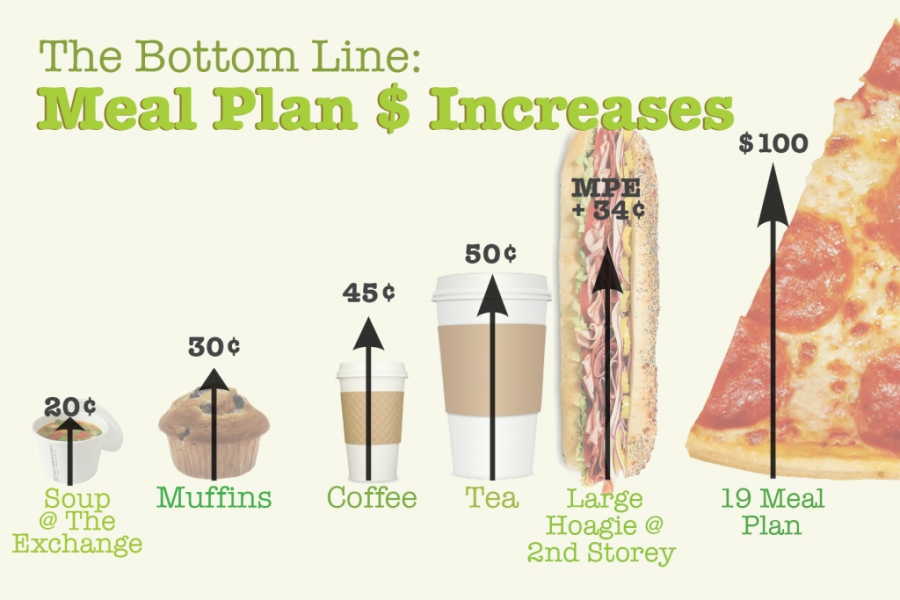Price Surge in Campus Dining
September 1, 2015
Prices in both residential dining halls and retail dining halls have risen this semester, and the University community is already taking notice. More expensive food items can be found in The Exchange, Holy Grounds, Belle Air Terrace, 2nd Storey, Cafe ‘Nova and beyond. For example, the door price at residential dining halls on campus has risen 2.3 percent over last year’s pricing, meaning the cash rate to enter a campus dining hall has gone up considerably.
Prices have also increased in retail locations like 2nd Storey, where the cost of a hoagie has increased over last year. One Meal Plan Express swipe used to afford one large hoagie, but students will now find they need an MPE and additional points to afford a large hoagie. Though students can still purchase one small hoagie, one drink and one side with a single meal swipe, students like Joe Yoon who live on West campus characterize this change in hoagie pricing as unwelcome. “I now have to use some approximately 34 cents of points to get my hoagie and those points are valuable,” Yoon said. Yoon went on to explain that the primary reason he has the meal plan is to get a fair deal on different snacks and beverages which he purchases regularly in locations like 2nd Storey, and he expressed frustration over using these precious points on a single hoagie.
Timothy Dietzler, Director of Villanova Dining Services, spoke with The Villanovan about these changes. Dietzler cites the recent egg shortage as a main contributor to the price hikes, explaining, “We are incurring food cost increases on all food items containing eggs. There is a severe egg shortage related to the avian flu. Egg prices have doubled as a result and we are on an allocation for eggs from our suppliers.” This egg shortage effects prices most noticeably through the sale of egg based products, like Holy Grounds muffins, which used to cost $2.29 but now cost $2.59. Breakfast items like pancakes and other egg-based products have also increased across the board on campus.
Dietzler also emphasized the high cost of fair trade items and acknowledged a price increase in other Holy Grounds items on campus. Perhaps most notable is the change in the price of both coffee and tea at this retail store. Dietzler explained that there was “approximately one-half of one percent increase” in the total price of all coffee on campus.
However, the price of both iced coffee and loose leaf tea has changed significantly at Holy Grounds. The price of a cold brew coffee increased by approximately 45 cents on campus and the price of tea increased by 50 cents this fall. Dietzler acknowledges that these changes are more significant but explains these increases are primarily due to a new brewing process for Peet’s coffee. Specifically, Holy Grounds is now utilizing a new, more expensive cold brew iced coffee, which Dietzler deems superior in taste and less acidic.
The cost of tea also increased in Holy Grounds when the retail store began to sell a new brand: “Mighty Leaf Tea.” This is a loose tea product which Dietzler believes to be of a distinctly higher quality. Dietzler characterized these specific price hikes as “unfortunate,” but explains that “[Dining Services] finds [the prices] to be less than what other operations are charging.”
Though Dining Services emphasizes that the total inflation rate of coffee on campus is below one percent, students like Aida Mohajeri (’17) are finding the price hike in Holy Grounds coffee to be particularly troubling and calls for more retailers on campus, explaining, “some off campus vendors cost less than what we’re being provided with. If that’s the case, we should allow competitors on campus too.”
Other notable campus price hikes can be found in dining locations like the Exchange, Belle Air Terrace or Cafe Nova. For example, there have been increases in the price of sandwiches due to an increased cost of deli meats and cheeses in these locations.
Students like Julia O’Connor (’18) have expressed frustration over this particular change. O’Connor frequently purchased a grilled cheese sandwich and fries with one MPE in Belle Air but explained that she now cannot afford this meal with just one swipe. The price of soup has also gone up by 20 cents in the Exchange, and professors like Ermaus Kersting have noticed.
Kersting dines on campus and therefore noted the changes characterizing the steady inflation of certain food items as “not subtle.” He therefore used the opportunity to design a lecture for his Theories of Macroeconomics class about inflation. He explains that “as an economist I don’t think it’s exploitation or ill will, but somehow it seems that the costs are going up at Villanova more than they are elsewhere in this industry.” Kersting believes it is important for his students to be responsible economists and pay attention to prices on campus.
Despite these changes, Dietzler thinks it is important to note some of the most exceptional deals that the University has to offer. For example, students can obtain a free 16 ounce coffee with a bakery purchase in the 2nd Storey. Additionally, the exchange offers a Bean Counter Special: a bagel with cream cheese and a 12 ounce coffee for $1.99. Additionally, $1.00 coffee is available in Belle Air Terrace.
Furthermore, certain favorable changes have been made to the meal plan this semester. The most notable of these changes may be the acceptance of meals within Freshens, the University’s smoothie and frozen yogurt shop in the Connelly Center. Though students used to have to wait for designated hours to use one Meal Plan Express in Freshens, the specialty store now accepts MPEs at all hours. Additionally, Freshens now provides a “Gluten Free Zone,” which offers premium organic ice cream, and gluten free parfaits, sandwiches and salads, including pints of ice cream that can be bought with MPEs.


